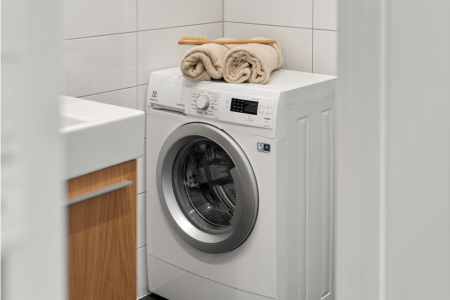Follow this simple step to prevent costly washing machine damage
By
Aubrey Razon
- Replies 0
As we age, we become more mindful of the routines that keep our homes in order. But there's one crucial task many overlook—your washing machine's water valves.
Could neglecting this simple check lead to a potential home disaster?
You might not think about your washing machine valves often. After all, they're just there, quietly doing their job... until they don't.
A video posted on social media by user @twinhomeexperts, which has garnered over 230,000 views, brings an often-overlooked issue to light.
The expert warns that if you don't check and twist your washing machine valves every six months, they could freeze and become nearly impossible to shut off in an emergency.
This isn't just a hypothetical situation.

Viewers of the video have shared their own horror stories, from clogged drains to leaking valves and even corroded main water shut-offs.
“Such a great idea and I do this now because (I) definitely learned the hard way! Even not using drains in your house for long periods[,] they will somehow clog themselves,” shared one viewer.
These incidents can lead to water damage, costly repairs, and a whole lot of headaches.
When temperatures plummet, the risk of pipes freezing increases. This includes the pipes leading to your washing machine.
If the water inside these pipes freezes and expands too much, it can cause the pipes to burst, leading to a messy and expensive situation.
Home Service Plumbing underscores the importance of turning off the water supply to your washing machine when it's not in use, a recommendation often found in the machine's instruction manual but frequently ignored.
If your valves are stiff or difficult to turn, it may be time to consider replacing them to ensure you can easily shut off the water when needed.
It's not just your washing machine that's at risk.
Pete the Plumber advises homeowners to shut off their main water supply if they plan to be away for more than a day. This simple step can prevent extensive water damage from frozen pipes or leaks.
And what about the hoses?
While many washing machines come with rubber hoses, these are not the most durable option.
Stainless steel braided hoses are recommended for their longevity and resistance to bursting.
This small investment can save you from a potential flood in your laundry room.
Here at The GrayVine, we understand the value of being proactive rather than reactive, especially when it comes to home maintenance. So, let's break it down into actionable steps:
By taking these steps, you can rest easy knowing that you've done your part to protect your home from unexpected water damage.
Let's keep our homes safe, secure, and dry—starting with the humble washing machine valve.

Have you ever experienced a washing machine mishap? Do you have any maintenance tips to share with our community? We'd love to hear from you! Share your stories, tips, and questions in the comments below.
Could neglecting this simple check lead to a potential home disaster?
You might not think about your washing machine valves often. After all, they're just there, quietly doing their job... until they don't.
A video posted on social media by user @twinhomeexperts, which has garnered over 230,000 views, brings an often-overlooked issue to light.
The expert warns that if you don't check and twist your washing machine valves every six months, they could freeze and become nearly impossible to shut off in an emergency.
This isn't just a hypothetical situation.

An expert has recommended checking and twisting your washing machine valves every six months. Image source: Lisa Anna/Pexels.
Viewers of the video have shared their own horror stories, from clogged drains to leaking valves and even corroded main water shut-offs.
“Such a great idea and I do this now because (I) definitely learned the hard way! Even not using drains in your house for long periods[,] they will somehow clog themselves,” shared one viewer.
These incidents can lead to water damage, costly repairs, and a whole lot of headaches.
When temperatures plummet, the risk of pipes freezing increases. This includes the pipes leading to your washing machine.
If the water inside these pipes freezes and expands too much, it can cause the pipes to burst, leading to a messy and expensive situation.
Home Service Plumbing underscores the importance of turning off the water supply to your washing machine when it's not in use, a recommendation often found in the machine's instruction manual but frequently ignored.
If your valves are stiff or difficult to turn, it may be time to consider replacing them to ensure you can easily shut off the water when needed.
It's not just your washing machine that's at risk.
Pete the Plumber advises homeowners to shut off their main water supply if they plan to be away for more than a day. This simple step can prevent extensive water damage from frozen pipes or leaks.
And what about the hoses?
While many washing machines come with rubber hoses, these are not the most durable option.
Stainless steel braided hoses are recommended for their longevity and resistance to bursting.
This small investment can save you from a potential flood in your laundry room.
Here at The GrayVine, we understand the value of being proactive rather than reactive, especially when it comes to home maintenance. So, let's break it down into actionable steps:
1. Inspect your washing machine valves
Locate the hot and cold water valves behind your washing machine and gently turn them back and forth to ensure they're not stuck.2. Schedule regular checks
Mark your calendar to check and twist these valves every six months. It's a simple task that can prevent a world of trouble.3. Upgrade your hoses
Consider replacing rubber hoses with braided stainless steel ones for added security against leaks and bursts.4. Know your main water shut-off
Familiarize yourself with the location and operation of your home's main water shut-off valve. It's your best defense against water damage when you're away from home.5. Share the knowledge
Talk to your friends, family, and neighbors about this often-overlooked aspect of home maintenance. You might just save someone from a laundry disaster.By taking these steps, you can rest easy knowing that you've done your part to protect your home from unexpected water damage.
Let's keep our homes safe, secure, and dry—starting with the humble washing machine valve.
Key Takeaways
- An expert has recommended checking and twisting your washing machine valves every six months to prevent them from freezing and seizing up.
- A video posted on social media by user @twinhomeexperts, with over 230,000 views, advises homeowners on how to maintain their washing machine valves and suggests using braided stainless steel hoses over rubber ones.
- Homeowners who have neglected this maintenance have shared their frustrations of dealing with issues like leaks and valve replacement.
- It's also suggested to turn off the water supply to the washing machine when not in use, as per the advice from Home Service Plumbing, to prevent water damage from leaks or frozen pipes.






